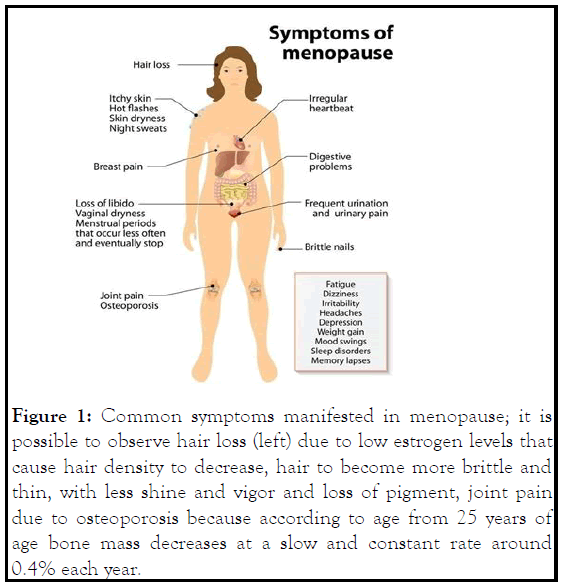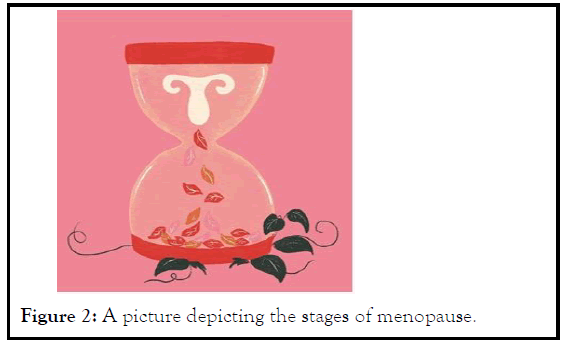Gynecology & Obstetrics
Open Access
ISSN: 2161-0932
ISSN: 2161-0932
Case Report - (2023)Volume 13, Issue 1
There are several factors that influence the alteration ovarian aging, which are influenced by environmental, genetic and surgical, in cases of patients who smoke and drink liquor excessively are factors that can also influence the process of menopause, it can even cause unwanted effects In the initial stages of menopause, however, pelvic radiation, hysterectomy, autoimmune disease, fallopian tube ligation before pre-menopause in patients and, in some cases, chemotherapy also lead to and even earlier menopause. The variation in symptoms is explained by individual attitudes of patients such as diet, reproductive history, body mass index, exercise, socioeconomic status, in the most erratic fluctuations in levels of female reproductive hormones. High levels of estrogen receptors are known to be present in the vaginal mucosa, vulva, bladder, urethra, and pelvic floor in remenopausal and postmenopausal women, however therefore, hypestrogenism, Genitourinary Meno-pause Syndrome (GMS) can cause harmful changes in patients, although GMS symptoms are common during menopausal transition in 50% dyspareunia, vaginal dryness has been prevalent in some clinical cases.
Hysterectomy; Fallopian tuve ligation; Bosy mass index; Erratic fluctuations; Hypestrogenism; Dyspaurenia; Pelvic radiation
GMS: Genitourinary Menopause Syndrome
There are patients who present today with undesirable symptoms 18 years of age by exercising weights and toms, such as osteoporosis in menopause; it is because in a sufficient intake of vitamin D and calcium. Clinical history during the pain they did not have prevention of it. Several clinical cases are known to occur, However these pathological manifestations can be avoided from therefore a history of lack of adequate nutrition, minerals deficits can also affect poor hair health, leaks can occur in the middle of the cycle. stress and poor hair care are also factors included as this The diagnosis of menopause can only be influences when the patient reaches the perimenopause established retrospectively, when the woman stage, low levels of estrogen and collagen cause hair loss completes 1 year without menstruating again.
At this stage, tiredness, lack of energy and unwillingness for everyday mastodinia or breast pain is because hormonal life events are also very common at the stage mentioned changes cause fluid to build up in the breasts, above. They occur not only because of hormonal imba making them feel swollen and sensitive; during lances, but also because of mood swings and lack of sleep. Perimenopause, hormonal fluctuations are more in general, fatigue improves in the climacteric stage. Hot dramatic, it is also common for breasts to get flashes are caused by reduced estrogen production, which bigger or smaller or change shape, during this causes a lack of regulation of the normal body thermostat.
Period
Breast pain around menopause may hot flashes in the premenopausal period begin and usually also feel different. People may experience last up to 2 years after menopause. During the rest of the burning or stabbing pain. Breast pain should climacteric, they tend to disappear, but about 10% of go away after a person stops having periods women remain for a long time, some up to 70 years. This completely and goes through menopause. Phase of heat usually occurs in the year before menopause. However, getting hormone therapy during however in sporadic cases some patients have lasted more menopause may increase the risk of ongoing than 2 years with manifestations of hot flashes.
Breast pain
Night sweats are a variant of hot flashes. In some women, intense sweating occurs during sleep. In many cases, these hot nights disturb sleep and aggravate the symptoms of fatigue and irritation of perimenopause. The consumption of alcoholic beverages during the day and rooms without air contributes to the worsening of the heat. Night coping, as already mentioned, is an important cause of sleep disturbances in the period of perimenopause. However, they are not the only ones. Many women in premenopause have difficulty sleeping even in the absence of hot flashes. Insomnia can occur up to 7 years before menopause and usually worsens in the last year of remenopausis. Anxious or depressed women tend to be those with the most difficulty sleeping (Figures 1 and 2).

Figure 1: Common symptoms manifested in menopause; it is possible to observe hair loss (left) due to low estrogen levels that cause hair density to decrease, hair to become more brittle and thin, with less shine and vigor and loss of pigment, joint pain due to osteoporosis because according to age from 25 years of age bone mass decreases at a slow and constant rate around 0.4% each year.

Figure 2: A picture depicting the stages of menopause.
Breast pain night sweats is a variant of hot flashes. In some women, intense sweating occurs during sleep. In many cases, these hot nights disturb sleep and aggravate the symptoms of fatigue and irritation of perimenopause [4]. The consumption of alcoholic beverages during the day and rooms without air contributes to the worsening of the heat [5]. Night coping, as already mentioned, is an important cause of sleep disturbances in the period of perimenopause. However, they are not the only ones. Many women in premenopause have difficulty sleeping even in the absence of hot flashes. Insomnia can occur up to 7 years before menopause and usually worsens in the last year of premenopausis. Anxious or depressed women tend to be those with the most difficulty sleeping [6].
Menstrual period changes can already occur even before the woman enters the premenopausal period. Initially the alterations are subtle and include changes in the intensity of bleeding and shortening of the cycle. As menopause approaches, menstrual changes are more evident. The cycle is now erratic and becomes longer, lasting 40 days to 50 days.
[Crossref] [Google Scholar] [PubMed]
[Crossref] [Google Scholar] [PubMed]
[Crossref] [Google Scholar] [PubMed]
[Crossref] [Google Scholar] [PubMed]
[Crossref] [Google Scholar] [PubMed]
Citation: Castillo C (2023) Hypothesis of Symptoms in Menopause. Gynecol Obstet. 13:600.
Received: 16-Aug-2022, Manuscript No. GOCR-22-18865; Editor assigned: 18-Aug-2022, Pre QC No. GOCR-22-18865(PQ); Reviewed: 01-Sep-2022, QC No. GOCR-22-18865; Revised: 30-Dec-2022, Manuscript No. GOCR-22-18865(R); Accepted: 25-Jan-2023 Published: 14-Feb-2023 , DOI: 10.35248/2161-0932.23.13.600
Copyright: © 2023 Castillo C. This is an open-access article distributed under the terms of the Creative Commons Attribution License, which permits unrestricted use, distribution, and reproduction in any medium, provided the original author and source are credited.